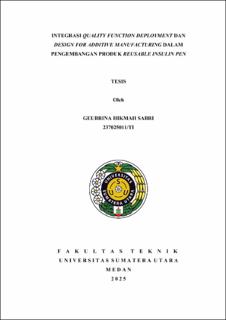| dc.contributor.advisor | Ginting, Rosnani | |
| dc.contributor.advisor | Napitupulu, Humala Lodewijk | |
| dc.contributor.author | Sabri, Geubrina Hikmah | |
| dc.date.accessioned | 2025-07-10T08:24:06Z | |
| dc.date.available | 2025-07-10T08:24:06Z | |
| dc.date.issued | 2025 | |
| dc.identifier.uri | https://repositori.usu.ac.id/handle/123456789/105216 | |
| dc.description.abstract | The use of insulin pens as outpatient therapy for the treatment of Diabetes Mellitus (DM) in Indonesia has been increasing annually alongside the rising prevalence of DM. Initial observations regarding the use of prefilled insulin pens indicate several design issues that do not meet user needs, such as oversized dimensions, lack of portability, difficulty in dosage input, challenges in waste management, and an increase in insulin pen waste. Therefore, this study was conducted with the aim of designing and developing a prototype of a reusable insulin pen that is environmentally friendly, integrating the methods of Human-Centered Design (HuCD), Quality Function Deployment (QFD), and Design for Additive Manufacturing (DfAM). The integration of HCD and QFD methods successfully identified the main design issues based on consumer needs, where there are 12 consumer attributes with 6 priority attributes that can be translated into technical characteristics. Meanwhile, the integration of QFD and DfAM can simplify component design and reduce the number of components from 12 to 9. With a design tolerance of 0.8 mm, the prototype was printed using 28.2 gr of PLA+ material, with a production cost of Rp50,615 and a production time of 3 hours and 53 minutes using the Anycubic Kobra 2 machine. The printed prototype was then tested conceptually, where from 5 respondents, 100% of users stated that the dimensions of the prototype were more comfortable and easier to carry compared to the actual insulin pen, reinforcing the success of the integrative approach in creating a prototype that meets user needs. | en_US |
| dc.language.iso | id | en_US |
| dc.publisher | Universitas Sumatera Utara | en_US |
| dc.subject | Product Development | en_US |
| dc.subject | Reusable Insulin Pen | en_US |
| dc.subject | Humanity-Centered Design | en_US |
| dc.subject | Quality Function Deployment | en_US |
| dc.subject | Design for Additive Manufacturing | en_US |
| dc.title | Integrasi Quality Function Deployment dan Design for Additive Manufacturing dalam Pengembangan Produk Reusable Insulin Pen | en_US |
| dc.title.alternative | Integration of Quality Function Deployment and Design for Additive Manufacturing in the Development of Reusable Insulin Pen | en_US |
| dc.type | Thesis | en_US |
| dc.identifier.nim | NIM237025011 | |
| dc.identifier.nidn | NIDN0021026303 | |
| dc.identifier.nidn | NIDN0019055401 | |
| dc.identifier.kodeprodi | KODEPRODI26101#Teknik Industri | |
| dc.description.pages | 138 Pages | en_US |
| dc.description.type | Tesis Magister | en_US |
| dc.subject.sdgs | SDGs 9. Industry Innovation And Infrastructure | en_US |


